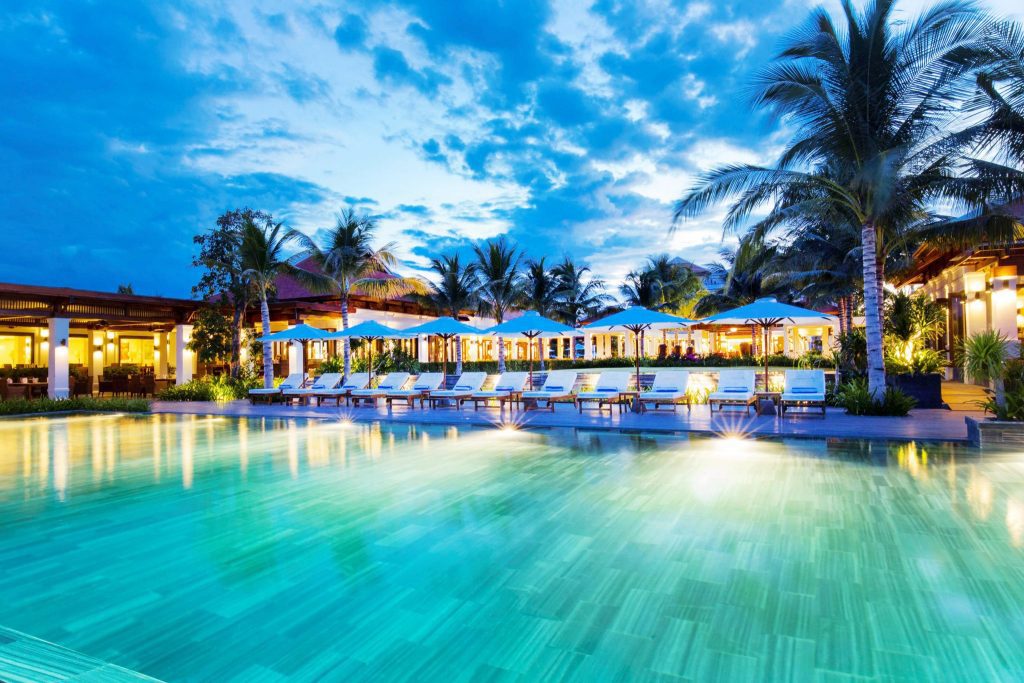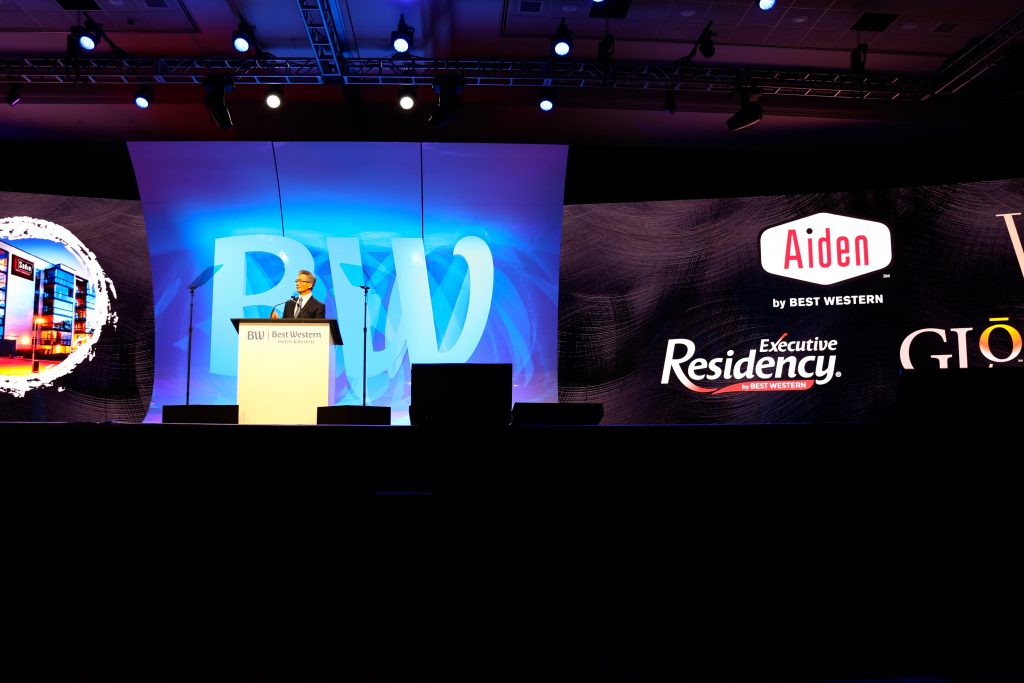Skift Take
BWH Hotel Group? That's Best Western's new corporate identity, the first change in decades and one that is designed to build its new image as a chain that can offer everything from mid-market to luxury.
These days, David Kong carries two cards. One is his usual Best Western Hotels & Resorts card, which he has been using since 2004 as president and CEO of the chain. The other carries a new corporate brand and logo, BWH Hotel Group, that will be used more and more as the months go by.
BWH combines the initials of Best Western and WorldHotels, which Best Western acquired fully a month ago. It is significant not only because it will replace the Best Western corporate identity that has been around since 1966 (although the chain was founded in 1946) but because it marks its evolution from a mid-market player to one that offers, for the first time, upper upscale and luxury segments. That’s thanks to the roughly 300 WorldHotels members and Kong is confident this will double to 600 hotels in just a few years. BWH is a private company and does not disclose its financials.
Until WorldHotels, Kong, who has been leading the transformation for Best Western to offer the full multi-tier brands, has reached to only upscale and upper upscale with the soft brand, BW Premier Collection, launched in 2015. WorldHotels is the next rung, making 14 the number of brands in the BWH Hotel Group portfolio.
The new corporate identity should also assuage owners who joined WorldHotels because they want to be associated as an upper upscale or luxury property, then find themselves part of a company that is widely recognized as a mid-market chain.
Asked how he deals with that, Kong said in an interview with Skift in Singapore, “When Accor bought Fairmont, Raffles, Swissotel, it was a mid-scale player too, with brands such as Ibis and Mercure.
“IHG [InterContinental Hotels Group] has the InterContinental brand but is much more known for its Holiday Inn brand, which is a competitor of Best Western.”
Kong added it’s also important that owners know WorldHotels will continue to run independently but now has the scale of a huge global player behind it. The BW Rewards loyalty program, for instance, will be white-labeled as WH Rewards for WorldHotels. The program has roughly 40 million members and in North America generates 48 percent of a hotel’s total revenue, according to Kong.
“We are protecting WorldHotels’ identity, independence and freedom. Basically we are retaining all the staff, there will be no changes to branding requirements, contracts, even the Sabre relationship which they enjoy. But we will supplement the efforts,” said Kong.
Why Luxury a Must
Why is having upper upscale and luxury so important to Best Western? According to Kong, he’s losing out because customers now have different needs for different travel purposes. Chains must offer the whole suite of options, not just different price points but locations.
“New York City is in hot demand, but we don’t have so many hotels there. So having WorldHotels in New York is important,” he said.
“The trend today is customization. There was a time when BMW had only three models, now it’s probably 40 models in the U.S. Why? Because there is a market. It’s about protecting your business and also reaching out to grab someone else’s. If you don’t have enough brands, you can’t protect your business.”
Kong said he discussed a potential alliance with WorldHotels three years ago. But Associated Luxury Hotels swooped it up in February 2016. The opportunity to acquire came when, after two years, Associated Luxury Hotels and WorldHotels “acknowledged the two businesses needed to move in different directions,” Geoff Andrew, CEO of WorldHotels, told Skift in a phone interview.
Contacted, Josh Lesnick, president and CEO of Associated Luxury Hotels, said, “From our perspective, we believe in today’s evolving environment that a 100 percent focus on expanding our luxury MICE [meeting, incentive, convention, exhibition] platform and services allows us to offer the greatest value for our luxury members and customers.”
Added Andrew, “We didn’t fall out with them. A lot of our hotels had done well through the relationship, but may be it [the business upside] was not fast enough; we needed a partner that could provide more solutions across more markets and geographic segments. On the other hand, Associated Luxury Hotels strategically is a strong MICE organization. So it’s a question of where more business would come from for both our members.”
WorldHotels and Best Western fit perfectly, said Kong, as the brands complement rather than compete and there are no overlaps unlike, say, Fairmont, Raffles and Swissotel.
“We make up for one another’s shortfalls,” he said. WorldHotels can also now sell to corporate accounts all tiers, from luxury to midscale to economy, giving its customers what they want at any given time.
Both are also a membership-based organization, where the hotels are independently owned and operated while locking in the advantages of a lodging affiliation. Aside from the loyalty program, this includes global marketing services, mass procurement and lower online travel agent fees.
“Both have a sense of family culture that we want to protect. We don’t do things arbitrarily like a big brand would. There’s a culture of collaboration and getting buy-in from members,” said Kong.
Both companies have been around a long time. WorldHotels will be 50 years old next year and Best Western, 75 years in two years. “People know we’re in this for a long time, that brings stability,” said Kong regarding frequent ownership changes at WorldHotels.
Biggest Weaknesses
When asked what he felt were WorldHotels’ biggest weaknesses, Kong said, “It’s the ability to deliver revenue as it is hamstrung by several factors. It does not have a loyalty program, which is a huge handicap. It’s also the scale of the company: if you can go to a travel manager and offer 600 locations, that’s better than 300 locations.
“The ability to invest is another, because you can’t grow the hotels without increasing sales and marketing and development resources. You need to invest in these areas and take a longterm view.
“We have already budgeted for this.”
The opportunity for WorldHotels to double its portfolio in a few years is “not far-fetched” as soft brands are continuing to grow in popularity while a lot of independent hotels will be debranding as their contracts are up for renewal, he said.
“What hotel company does not have a soft brand, at least one? The fact is, a lot of independent hotels don’t want the onerous branding of hard brands, but want the engine of the big brands to drive sales and help them become less dependent on online travel agencies,” he said.
He expects growth in China and the rest of Asia, as well as in North America where WorldHotels is under-represented. Currently, a third of the WorldHotels portfolio is in Asia, another third in Europe and the rest scattered outside the two continents.
Not for Sale
Meanwhile, Preferred Hotels & Resorts and Small Luxury Hotels of the World said they are not for sale.
Preferred CEO Lindsey Ueberroth told Skift, “My family is very passionate about what we do and love owning and running this company. We see the rise in launch of soft brands by the major chains and some of these acquisitions as a validation of what we have now been doing for 50 years.
“We would actually be more interested in acquisitions on our end. Finding strategic partners that would add value to our partners.”
Small Luxury Hotels’ Vice President Asia-Pacific Mark Wong said the right fit is the key to a successful partnership, as shown in its loyalty program alliance with Hyatt Hotels.
“What is important in an acquisition or an alliance is that the positioning and the values of each partner are perfectly aligned. Our strategic alliance with World of Hyatt is such an example where we are both family owned business, share the same positioning in the luxury sector, cherish local communities and experiences and celebrate ‘small.’ Hyatt is small within its category,” said Wong.
When asked what lessons Best Western could take away from Starwood’s acquisition of a 50 percent stake in Design Hotels, Ueberroth said ensuring that members don’t feel lost in a big pond.
“I have heard mixed reviews. The biggest benefit for some hotels is access to a large loyalty program, however many now feel like they are lost in a very big pond now and there isn’t much focus on what Design Hotels stood for. Some feel they have gotten lost in what is now 30 brands and many have not joined the loyalty program due to costs.”
Something, no doubt, that Kong is already very mindful of.
Have a confidential tip for Skift? Get in touch
Tags: accor, acquisitions, alliances, best western, ihg, soft brands, worldhotels
Photo credit: The Anam Villas in Vietnam, a member of WorldHotels. WorldHotels


